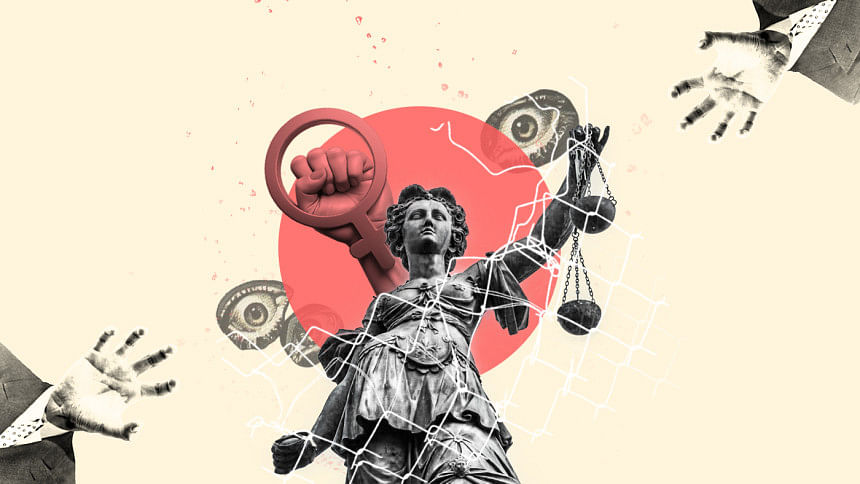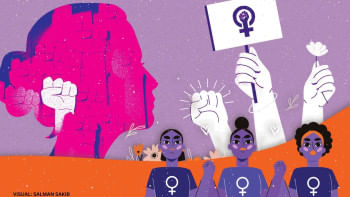Men’s fear and women's 'just rights'

"Whenever the question of women's rights arises, excuses like religion or culture are used to stop it. Why?" This question was asked by a young woman from a Catholic family in Argentina. On another occasion, the same question came from a Sudanese Muslim woman. I am sure the same question exists in the minds of countless women in Bangladesh, too.
Everywhere—in homes, on the streets, in religious places—a number of men are eager to bring up religion whenever a women's issue comes up. Often, we come across many men who are not religious themselves but try to use religion or culture to oppose women's choices of clothing, lifestyle, occupations, etc. Regardless of their connection to religion, most men's justifications tend to converge when it comes to women. This is evident across various faith systems not just in Bangladesh but across the world.
In the current Muslim inheritance law, the person who seems disadvantaged when a woman gains equal rights is the man, primarily the brother(s). If there is no brother, then the uncle(s) and their sons on the father's side get a portion of the father's property instead of the daughter(s) getting all of it. But were all those who started the panic over equal property rights just these brothers and uncles? It doesn't seem so. Many in those crowds have daughters of their own. If their daughters get equal rights, what is their problem? Not many who protested equal inheritance rights have much property. What is this constant fear about, then, when it comes to women's rights? Or are they being used as pawns by interest groups?
In Muslim family law, the reason for a woman's smaller share of property has been that the man or men in the family would bear her full responsibility. But if this assumption no longer holds true, why won't today's religious scholars be open to updating the interpretations? In several countries—Turkey, Iraq, Tunisia, Morocco—religious scholars have taken steps to revise the law.
In Hindu and Buddhist societies, the tradition used to be giving a woman wealth or dowry during marriage. Sons inherited the father's property, daughters didn't get any share. Now, in India, equal inheritance rights for women and men have been provided legally. But in Hindu-Buddhist minority families in Bangladesh, girls are still deprived, which is justified using religion.
In Bangladesh, the number of families where men provide for women is rapidly decreasing. In fact, among the poor, a significant number of households are run by women. In middle- and upper-class families, more and more women are working. Many women now carry the responsibility of financially supporting their families. Some argue that since women get a share from both their father's and husband's properties, they already receive more. However, after receiving a large share of inheritance from his father, doesn't a man also keep an eye on his wife's property?
It's often assumed that all adult women are married, that their marriages are stable, and that they receive all their legal rights. But, research, field observations, and lived experiences show none of these are fully true. Unmarried, divorced or widowed women are excluded from these considerations.
There has been many cases where the inheritance that married women receive from their fathers exists only on paper. Most women still lack a stable place of their own. In some cases, their husbands pressure them to bring property from their fathers, while their brothers pressure them not to take it. If a woman takes her full share, she risks losing her connection with her natal family—the right to return, visit, or be loved.
A woman's right to her husband's property is negligible, and often more theoretical than real. In both villages and cities, there are painful stories of cruelty and deprivation. Research shows that in rural farmers' families, a woman's working hours exceed those of men when counting all agricultural tasks, livestock care, and household work. Yet, her rights over property, maintaining which she has spent countless hours, remain uncertain. If she manages the household with her husband, she might retain use of the property, but not ownership. If that partnership breaks down, everything—land, house, animals, crops—can disappear overnight. And if she also has no inheritance from her parents to fall back on, she is left with nothing. She may have to survive under the care of her son(s). But what if the sons refuse to do so? We often hear that sons take responsibility for ageing parents and therefore deserve a larger share of property than their sisters. But that is not always the reality. There have been countless cases where sons were found not caring for their elderly parents. Daughters, on the other hand, have been often found to have taken on that responsibility.
Let me give you an example. In my maternal grandmother's village lives a girl named Pemi, who has speech impairment. Her hut is a one room structure on someone else's land. She lives there with her sick mother, caring for and working hard to provide food for her. Her father had a small piece of land; her only brother took almost all of it, saying her share was spent on her dowry during her wedding. That marriage didn't last. She returned home. The brother didn't take her or their mother in. He says he can't afford to feed them.
So now, women of two generations—one denied property, the other with poor, uncertain income—live in a hut. Pemi tries to find work day and night to keep her mother alive. Sometimes she requests a local hujur for the treatment of her mother's unknown illness. Sometimes, mother and daughter cry together—not a normal sob, but a terrifying, heart-wrenching wailing. The villagers understand: Pemi couldn't bring along her child. Her former husband, backed by law, custom and patriarchal power, kept the child with him. Thinking about the child might be the one thing that breaks this hardworking girl's resilience.
In Dhaka city, in our neighbourhood, I recently heard of a bitter quarrel among brothers who own a building. None of them wants to take care of their mother. They calculate the cost of her stay, food, everything. This mother's misfortune is greater because she has no daughter to look after her.
Inside and outside the home, many women in Bangladesh go through painful struggles. There are countless teenage girls whose lives are at risk of turning out like those of Yasmin, Tonu, and Munia. And those who survive such odds still face harassment every day. It is hard to find a girl or a woman who has not been teased or attacked by unruly males or thugs while walking on the street. Lately, my students—current and former—tell me of a newer kind of harassment: men standing in front of them and threatening them for not wearing a burqa, using obscene language. These men want women to be submissive and/or send them back indoors. And wearing a burqa doesn't provide much safety either. I've heard of bitter experiences suffered by my students who wear it.
People in Bangladesh live under a net of oppression and discrimination. For women, this net is even more complex. If men's groups see the woman who gave birth to them as inferior, what does that say about them? These people sometimes insist on giving women "just rights" instead of "equal rights." But if rights are to be truly just—based on labour, contribution, hard work, and roles—then women should receive more than men. Will they accept that?
Anu Muhammad is former professor of economics at Jahangirnagar University.
Views expressed in this article are the author's own.
Follow The Daily Star Opinion on Facebook for the latest opinions, commentaries and analyses by experts and professionals. To contribute your article or letter to The Daily Star Opinion, see our guidelines for submission.

 For all latest news, follow The Daily Star's Google News channel.
For all latest news, follow The Daily Star's Google News channel. 










Comments